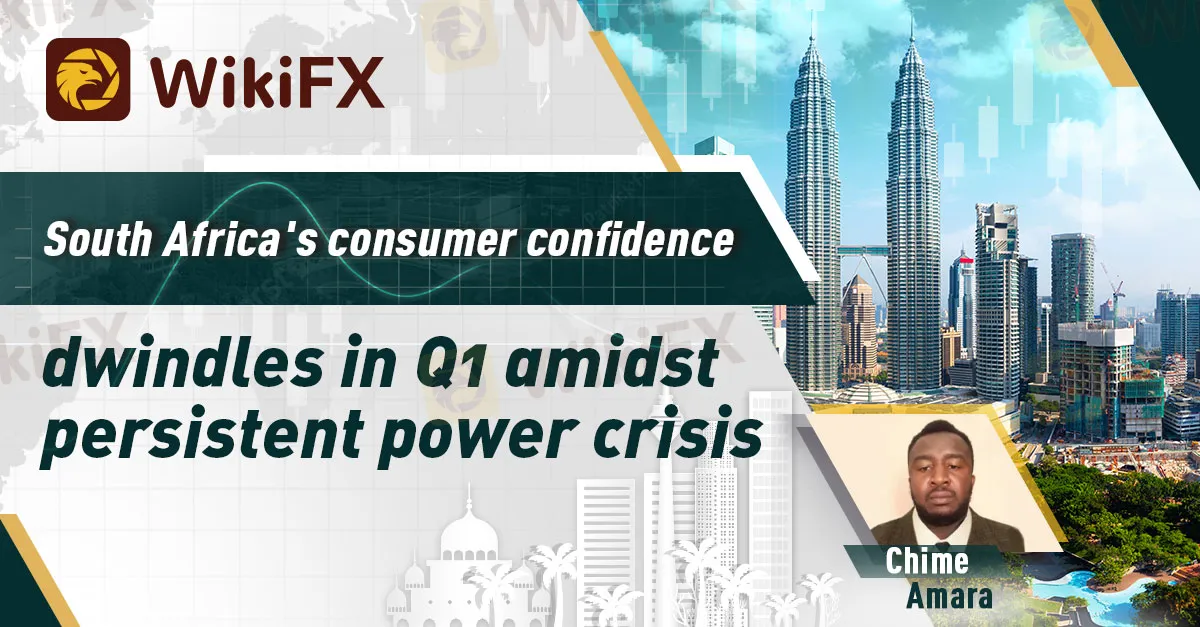简体中文
繁體中文
English
Pусский
日本語
ภาษาไทย
Tiếng Việt
Bahasa Indonesia
Español
हिन्दी
Filippiiniläinen
Français
Deutsch
Português
Türkçe
한국어
العربية
South Africa's consumer confidence dwindles in Q1 amidst persistent power crisis
Abstract:South Africa's economy has witnessed a decline in consumers' confidence within the first quarter of 2023 which has been fueled by the persistent power crisis.

By: Chime Amara

Johannesburg, South Africa - The first quarter of 2023 has seen South Africa's consumer confidence plummeting due to the country's persistent power crisis, according to the latest report released by the Bureau for Economic Research.
The report revealed that consumer confidence fell to -23 points in the first quarter of 2023 against the -8 points witnessed in the fourth quarter of 2022.
The ongoing power crisis, characterized by widespread blackouts and load shedding, was cited as the main reason for the decline in consumer confidence.
The power crisis has had a significant impact on the economy, with many businesses forced to shut down or scale back operations. As a result, unemployment rates have soared, leaving many South Africans struggling to make ends meet.
“The ongoing power crisis is having a devastating impact on the economy and the lives of ordinary South Africans,” said a spokesperson for the Bureau for Economic Research. “The decline in consumer confidence is a clear reflection of the uncertainty and anxiety that many people are feeling.”
The report also highlighted the impact of rising inflation on consumer confidence. Thus the inflation rate which rose further in February to 7% from the previous 6.9% seen in January has further diminished investors' confidence.
Despite the challenging economic environment, the South African government has pledged to address the power crisis and revive the economy. The government has announced plans to increase investment in renewable energy and improve the efficiency of the country's power grid.
The decline in consumer confidence is a worrying sign for South Africa's economy, but there are glimmers of hope on the horizon. With the government's renewed focus on addressing the power crisis and improving the economy, there is a chance that consumer confidence will recover in the coming months.

Disclaimer:
The views in this article only represent the author's personal views, and do not constitute investment advice on this platform. This platform does not guarantee the accuracy, completeness and timeliness of the information in the article, and will not be liable for any loss caused by the use of or reliance on the information in the article.
Read more

Webull and Others Fined $275,000 for Incomplete Suspicious Activity Reports
Webull Financial, alongside Lightspeed Financial Services Group and Paulson Investment Company, LLC, has agreed to pay a collective fine of $275,000 following an investigation by the US Securities and Exchange Commission (SEC). The penalty was issued due to the firms’ failure to include essential information in suspicious activity reports (SARs) over a four-year period.

Barclays Resolves £40M Fine Over 2008 Fundraising Disclosure Failures
Barclays has reached a settlement with the UK’s Financial Conduct Authority (FCA), agreeing to pay a £40 million fine for failing to adequately disclose arrangements with Qatari investors during its critical fundraising efforts amidst the 2008 financial crisis.

WikiEXPO Global Expert Interview: Advanced Practices and Insights in Financial Regulation
In the midst of rapid advancements and evolving landscapes in financial technology, financial regulation, and ensuring financial security, WikiGlobal stands at the forefront, closely tracking these transformative trends. As we embark on our series of exclusive interviews focusing on these pivotal areas, we are delighted to have had an in-depth conversation with.

Alleged Concerns with TradeEU.global's Trading Practices
An individual trader has come forward with allegations of an unfavourable experience while using the services of the broker TradeEU.global.
WikiFX Broker
Latest News
Saxo & Portuguese Bank Partnership
SEC Fines Broker-Dealers $275K for Incomplete SAR Filings
Elon Musk Warns of Imminent US Bankruptcy | Bitcoin Retreats from $100K
UK FCA Fines Barclays £40 Million Over 2008 Deal
WikiEXPO Global Expert Interview: Advanced Practices and Insights in Financial Regulation
Justin Sun Invests $30M in Trump-Backed World Liberty Financial
Lured by False Promises: Malaysian Driver Lost RM218K to an Investment Scam
FTX Sets March 2025 Timeline for Creditor Payouts: What It Means for Investors
What is an Economic Calendar? How it works
Pros & Cons of Automated Forex Trading
Currency Calculator


